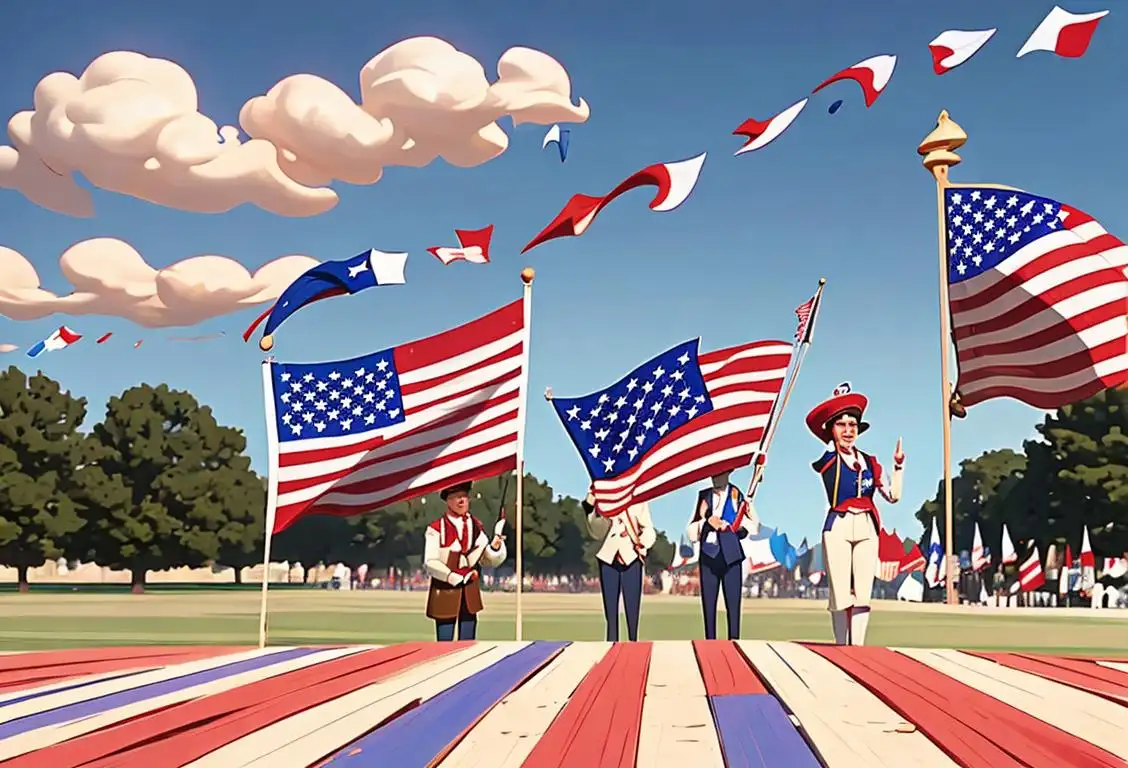National Laughter Day

Laughter is the best medicine, and on National Laughter Day, we celebrate all the joy and hilarity that laughter brings into our lives. Get ready to laugh until your belly hurts!
When is Laughter Day?
It's national laughter day on the 8th May.
The Origins of National Laughter Day
Laughter has always been an important part of human culture. From ancient jesters to modern-day comedians, people have been tickling each other's funny bones for centuries. But when did National Laughter Day come into existence?
Believe it or not, the internet is partially to blame for this delightful celebration. National Laughter Day was born in the depths of online forums and social media platforms, where people realized the power of laughter to bring joy and positivity into our lives.
In 2012, a group of internet enthusiasts came together and declared May 8th as National Laughter Day. They wanted to create a day where people could come together and share funny jokes, hilarious memes, and heartwarming stories that would bring a smile to everyone's face.
How to Celebrate National Laughter Day
Celebrating National Laughter Day is as easy as letting out a hearty laugh. Here are a few suggestions to make the day even more special:
- Gather your loved ones and have a laughter-filled movie night. Pick out a comedy classic or watch the latest stand-up special that has everyone rolling on the floor with laughter.
- Organize a laughter yoga session with your friends. Laughter yoga combines deep breathing exercises with playful laughter, resulting in a unique and uplifting experience.
- Join a local comedy show or open mic night. Support your local comedians and get ready for an evening full of giggles.
- Share funny jokes or memes on social media. Spread the joy and brighten up someone's day with a good laugh.
Did You Know?
Did you know that laughter is contagious? Research shows that hearing laughter, even from a recording, can make you laugh too. So, surround yourself with laughter and let the giggles spread!
History behind the term 'Laughter'
1000 BCE
Ancient Beginnings
Laughter has its roots in ancient civilizations, where it played a significant role in society. In 1000 BCE, the term laughter did not exist in its modern form, but the act of laughing was recognized as a universal human behavior. In ancient cultures such as the Egyptians, Greeks, and Romans, laughter was seen as a way to express joy, amusement, and sometimes even mockery.
2000 BC
Earliest Written Record
Laughter has been recorded as a form of expression as early as 2000 BC. The Sumerians, an ancient civilization in Mesopotamia, depicted laughter in cuneiform inscriptions on clay tablets. These inscriptions showed that laughter played a significant role in their culture and communication.
4th Century BC
Philosophical Perspective
In the 4th century BC, Greek philosophers began exploring the concept of laughter. Plato believed that laughter was a response to feelings of superiority or mockery. Aristotle, on the other hand, saw laughter as a social bonding mechanism and a sign of amusement.
1382 CE
Origin of 'Laughter'
The term 'laughter' itself can be traced back to the Middle English period. In 1382, the word 'laughter' first appeared in Geoffrey Chaucer's acclaimed work, The Canterbury Tales. Chaucer used 'laughter' to describe the act of laughing, marking the beginning of its formal existence in English literature.
14th Century AD
The Laughter Renaissance
During the 14th century, laughter experienced a renaissance in European literature and art. Geoffrey Chaucer, known for his famous work 'The Canterbury Tales,' incorporated humor and satire into his writings, showcasing the societal importance of laughter.
18th Century
Humor Theory and Scientific Interest
During the 18th century, laughter garnered significant interest from philosophers and scientists. Prominent figures like Jean-Baptiste Du Bos and Francis Hutcheson explored the theory of humor, delving into the psychological and physiological aspects of laughter. These early studies laid the foundation for further research and Enlightenment thinkers' fascination with the topic.
18th Century AD
Scientific Study of Humor
In the 18th century, laughter gained attention from scientists and scholars. Thomas Hobbes and Henri Bergson explored the theories of humor, emphasizing laughter as a response to incongruity and social norms. This scientific study laid the foundation for further analysis of laughter in psychology and sociology.
19th Century
Comedy Clubs and Vaudeville
In the 19th century, laughter found its way into entertainment venues. Comedy clubs and vaudeville shows became popular, providing platforms for comedians to make people laugh. The rising laughter culture not only entertained audiences but also helped shape the art of comedy as we know it today. Comedians like Charlie Chaplin and Buster Keaton made an indelible mark on the history of entertainment.
20th Century AD
The Laughter Yoga Movement
In the late 20th century, Dr. Madan Kataria popularized the concept of Laughter Yoga, a unique practice combining laughter with yogic breathing exercises. Laughter Yoga quickly spread worldwide, highlighting the physical and psychological benefits of laughter on overall well-being. Today, Laughter Yoga classes and clubs exist in numerous countries.
20th Century
Laughter as Medicine
The therapeutic effects of laughter gained recognition in the early 20th century. Norman Cousins, an American journalist, documented his experience using laughter to alleviate pain in his book 'Anatomy of an Illness.' This led to further scientific research on the health benefits of laughter, ultimately leading to the establishment of 'laughter therapy' or 'laughter yoga' programs in the modern era.
21st Century
Laughter in the Digital Age
The advent of the internet and social media in the 21st century revolutionized the way people experience and share laughter. Memes, GIFs, and viral videos have become popular mediums for spreading humor and eliciting laughter online. The digital age has paved the way for new forms of comedic expression and transformed laughter into a global, instantaneously shareable phenomenon.
Did you know?
Did you know that laughter is contagious? Research shows that hearing laughter, even from a recording, can make you laugh too. So, surround yourself with laughter and let the giggles spread!Tagged
fun rememberanceFirst identified
14th April 2015Most mentioned on
8th May 2017Total mentions
326Other days
Cancer Survivors Day
Suicide Prevention Day
Flag Day
Pumpkin Day
Memorial Day
Bestfriends Day
Heroes Day
Liberation Day
Unemployed Day
Voters Day









